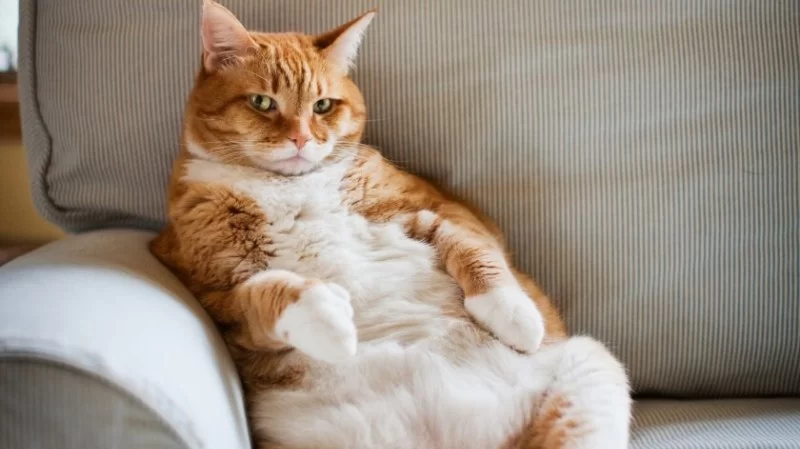- pet-obesity-in-america-understanding-the-scale-of-the-problem - Pet Obesity in America: Understanding the Scale of the Problem
- common-causes-of-pet-obesity-in-the-us - Common Causes of Pet Obesity in the U.S.
- health-risks-associated-with-pet-obesity - Health Risks Associated with Pet Obesity
- real-pet-obesity-cases-how-increased-awareness-changed-lives - Real Pet Obesity Cases: How Increased Awareness Changed Lives
- proactive-ways-to-help-your-pet-stay-healthy - Proactive Ways to Help Your Pet Stay Healthy
- how-hidden-brook-veterinary-supports-healthier-pets - How Hidden Brook Veterinary Supports Healthier Pets
1. Pet Obesity in America: Understanding the Scale of the Problem
Pet obesity in America is no longer just an occasional issue—it’s become a full-blown epidemic. According to recent studies by the Association for Pet Obesity Prevention, over 59% of cats and 55% of dogs in the U.S. are classified as overweight or obese. While it might be tempting to shrug off a “chubby” pet as cute, excess weight brings serious consequences.
The problem is bigger than aesthetics. Obesity shortens pets’ lifespans, reduces quality of life, and increases veterinary costs. Worse, many pet owners are unaware their animals are even overweight—making education and awareness crucial first steps.

2700 W Higgins Rd, Hoffman Estates, IL 60169, USA
See Details2. Common Causes of Pet Obesity in the U.S.
Understanding how pets become obese can help prevent it. One major contributor is overfeeding and excessive treats. Many pet owners unknowingly exceed daily caloric needs by giving multiple treats a day or allowing pets to graze freely.
Another factor is lack of exercise, particularly for urban or indoor pets. Busy lifestyles often mean shorter walks and more time alone, leading to weight gain and boredom-eating behaviors. In some cases, medical issues like hypothyroidism or arthritis also play a role, limiting movement or increasing appetite.
Finally, misperceptions about ideal body weight are a key problem. When so many pets are overweight, a normal-sized dog may actually appear underfed to the average eye.
3. Health Risks Associated with Pet Obesity
Obesity doesn’t just impact how your pet looks—it dramatically affects how they feel and function. Extra weight can put pressure on the joints, worsening conditions like arthritis. It increases the risk of diabetes, heart disease, respiratory issues, liver disease, and even some cancers.
In dogs, studies have shown that obesity shortens lifespan by nearly two years. Cats, on the other hand, face increased risks of hepatic lipidosis (a potentially fatal liver condition), especially during periods of rapid weight loss.
Behavioral changes may occur, too. Overweight pets often sleep more, play less, and may show signs of depression or irritability—all subtle signs that their health is declining.
4. Real Pet Obesity Cases: How Increased Awareness Changed Lives
Consider Bella, a golden retriever from Illinois who weighed 108 lbs at her heaviest. Her owner, Dave, admitted he had no idea she was obese—until she struggled to climb stairs and began panting after short walks. After a vet consultation, Bella was placed on a portion-controlled diet and daily walking plan. Over the course of eight months, she lost 28 lbs and regained her playful energy.
Then there’s Milo, a Maine Coon cat whose constant snacking pushed him to 23 lbs. His vet at Hidden Brook Veterinary introduced puzzle feeders and a calorie-adjusted meal plan. In just five months, Milo dropped 5 lbs and returned to climbing shelves—something he hadn’t done in years.
These stories highlight that it’s never too late to reverse obesity—and that small changes can yield dramatic improvements.
5. Proactive Ways to Help Your Pet Stay Healthy
Preventing and addressing pet obesity starts at home. Begin by monitoring portion sizes carefully—use a measuring cup instead of estimating. Stick to a consistent feeding schedule, and reduce table scraps or high-calorie treats.
Incorporate daily activity tailored to your pet’s needs. For dogs, that could mean longer or more frequent walks, agility play, or fetch games. Cats may benefit from climbing trees, laser pointer sessions, or feather toys.
Regular veterinary weigh-ins also help track progress and adjust plans as needed. Some clinics even offer pet weight loss programs and check-ins for accountability.
6. How Hidden Brook Veterinary Supports Healthier Pets
At Hidden Brook Veterinary, we understand that pet obesity in America is a growing challenge—and we’re here to help pet owners meet it head-on. Our team offers full nutritional evaluations, customized weight loss plans, and metabolic screenings to identify underlying issues.
We also guide pet parents through healthier feeding practices and help them understand what “normal weight” looks like for different breeds and ages. Whether your dog just needs a bit more exercise or your cat requires prescription food, our experts will build a practical and compassionate approach.
Helping pets live longer, healthier lives is our mission—and that starts with tackling obesity one pet at a time.











